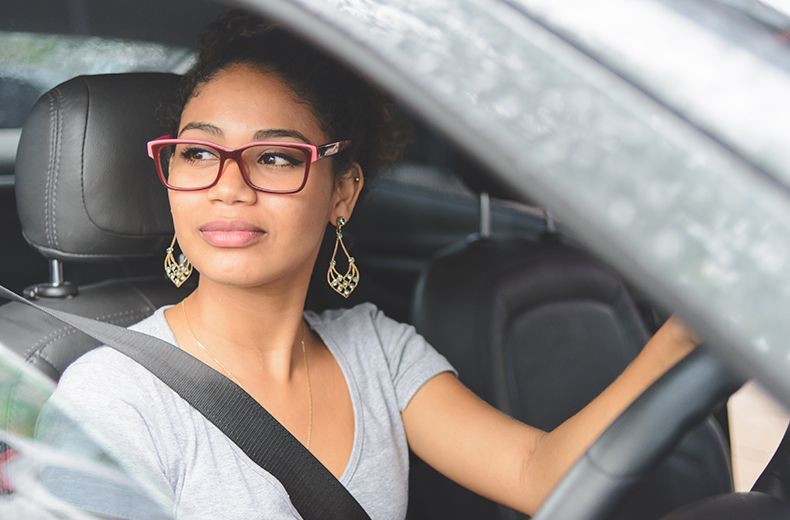There are driving eyesight requirements that all motorists must meet by law. You can and should wear glasses or contact lenses in order to fulfil the criteria.
Driving eyesight requirements
Eyesight deterioration can be slow which is why it’s so important to have your eyes tested at least every two years, or straight away if you notice a problem.
If you have any problems with your eyes other than being long or short sighted or colour-blind, you must inform the DVLA.
You must be able to read (with glasses or contact lenses, if necessary) a car number plate made after 1 September 2001 from 20 metres.
You must also have a visual acuity of at least decimal 0.5 (6/12) measured on the Snellen scale and an adequate field of vision. Your optician will be able to test for all three of these factors.
Drivers aged over 70 have to declare when renewing their licence that their eyesight meets minimum legal standards.
They don’t have to provide evidence of this but could be held liable if they’re in an accident and it’s thought that poor eye health was a contributing factor.
- Driving over 70: a guide to driving for the elderly
- What is a driving test fail? Majors and minors explained
- Did you know that we offer specialist learner driver insurance?
Driving eyesight medical requirements
Here are some of the reasons why a medical condition may impact your ability to drive. Driving with impaired vision is illegal and could result in a fine and police action.
- Blepharospasm
- Cataracts
- Cranial nerve palsy (with double vision)
- Diplopia (double vision)
- Glaucoma
- Loss of an eye
- Macular degeneration
- Monocular vision (sight in one eye only)
- Night blindness (nyctalopia)
- Ocular myasthenia gravis (with double vision)
- Ophthalmoplegia (with double vision)
- Retinitis pigmentosa
- Retinopathy (with laser treatment)
- Tunnel vision
- Visual acuity (reduced)
- Visual field defect
- Diabetic retinopathy (with laser treatment)
You may need to tell the DVLA about your eyesight problem, so check their list of medical conditions that could affect your driving.
Driving test eye test
Every learner driver is subjected to a quick eye test at the beginning of their official driving test which involves correctly reading a number plate on a parked vehicle from 20 meters away.
If you get it wrong after 3 tries, you'll fail the entire test immediately. Also, the DVLA will be told and your licence will be revoked.
You can reapply for a driving license but you’ll be asked to have an eyesight test with DVSA at a driving test centre. If you pass, you can then go on to take the driving test.
Read more about learning to drive in our handy guides.
To summarise, in order to legally learn to drive, learners should meet the standards if they can read a number plate from 20 metres away; have no double vision; and have a normal field of vision in at least one eye (an optician can test this).
Fines for having wrong eyesight prescription
According to research from the Association of Optometrists (AOP), two-thirds of drivers in the UK who use glasses are ‘putting off’ updating their prescription. As a result, their vision isn’t suitable for driving – increasing the risk of accidents.
Should vision play a factor in any collision, then it could result in a fine of £1,000 and three points on a driving licence.
Delaying eye tests is an increasing problem. The data showed that up to 20% of drivers who require glasses have not have their eyes tests in at least three years.
In the most serious cases, it could result in a driving disqualification.
The police have the power to carry out vision screen tests on the side of the road. Drivers who are pulled over will need to be able to read a number plate 20 metres away.
AOP's report showed that one in ten Brits said that they would continue driving even if their vision was deemed unsafe to be behind the wheel. And almost half of Britain’s optometrists reported to the AOP that they have dealt with patients that were driving on the roads, despite their vision being legally too dangerous.
Police data from 2022-23 has shown that around 3,000 people are killed or injured by drivers with bad eyesight (or where eyesight has played a part in the cause of the collision) every year.
Further research from the Department for Transport (DfT) has shown that 42% of incidents involving drivers over the age of 70 were due to sight issues.
Reporting an eye condition to the DVLA
If a driver has a condition in one eye and another condition affecting the other eye, then they will need to fill in and send form V1 to the Driver and Vehicle Licensing Agency (DVLA).
Drivers can also report their confition on their online portal.
Learner Driver Car Insurance
Only pay for the cover you need until you’ve passed your test. Get learner driver insurance so you can practice outside of your lessons.














